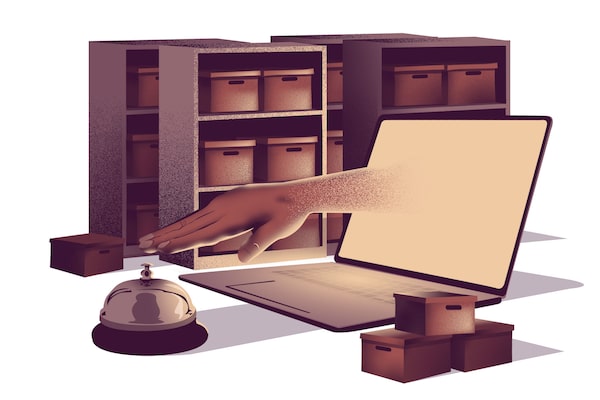
Requesting information from public institutions is every Canadian's right, but the system for filing such requests is cumbersome and gives governments many incentives to withhold or redact documents. Secret Canada is a project that aims to change that.Illustration by Romain Lasser
On a brisk afternoon in the fall of 2021, two Globe and Mail investigative reporters sat down to talk about freedom of information.
This isn’t particularly unusual: Journalists often gripe to each other about FOI – about delays, excessive redactions and the walls we constantly hit in our pursuit of the information closely guarded by public institutions. But these conversations are usually nothing more than bellyaching at the bar, frustrated colleagues commiserating about an overburdened, under-resourced and overly secretive access system.
That’s where the conversation usually ends. But the discussion that afternoon took on a different tone. We were those two reporters, and we’d decided enough was enough. If Canada’s broken access system wasn’t going to improve on its own, we were going to give it a push.
From the beginning, we knew that an investigation into freedom of information would be a hard sell. This wasn’t an unsolved murder or a crypto scam. It was a story about a sclerotic system – one that will never be made into a movie.
So we dreamed big. We talked about a national, investigative docuseries on transparency, or filing FOIs we knew would be denied and then taking our fight all the way to the Supreme Court of Canada.
We eventually settled on an altogether different idea: A website that would act as a clearinghouse of information on FOI. Our editor-in-chief, David Walmsley, started calling it Secret Canada, and the name stuck. The work became all-consuming for the next 20 months.
In total, we interviewed well over 200 experts and filed more than 500 FOI requests to every level of government. This included federal, provincial and territorial governments, as well as major municipalities, police forces, hospitals and school boards across the country. We wrote and mailed more than 150 cheques. This is a requirement in many jurisdictions to kickstart requests. (Have we mentioned the system is antiquated?)
The irony of using Canada’s decaying FOI system to investigate FOI was not lost on us. Every request had a dual purpose. We wanted to know what governments were saying about the system internally, and we also wanted to test and measure how they would respond to the request itself.
At times, the work was deflating. We spent months negotiating access to data for our investigation, only to find that many public bodies sent us unreadable files – or, in the case of the province of Alberta, refused us entirely. (Or at least that was the case until, two days before publication, senior bureaucrats with the province reached out and asked if it was too late to contribute something to the project. It was.)
We tried to unravel the myriad reasons public institutions retreat from transparency. The answers to that, we found, are varied and complicated, but include structural problems that incentivize the withholding of information.
Throughout our investigation, we constantly wondered whether our obsession would resonate with ordinary people. Freedom of information is, after all, a very abstract concept. Then, in October, 2022, we published our first story under the Secret Canada banner – an early flag-planting exercise meant to signal to our audience that we were serious about tackling this country’s culture of secrecy. At the bottom of that story, we asked readers to reach out with their own stories about FOI.
The responses to that first story were overwhelming. Over the next few months, we heard from more than 100 people – lawyers, real estate developers, professors, civil servants, small business owners, archivists and activists – who’d had their own distressing run-ins with our FOI systems.
Those messages affirmed for us that freedom of information laws are not just for journalists, gadflies or back-biting politicians. They are for everyone: the concerned citizen who wants to know why they’re paying more for trash pick-up, the car crash victim looking to file an insurance claim and the international student trying to secure permanent residency.
We hope Secret Canada will spark for others the same passion for transparency and accountability that drives us, and demonstrate the power of a few simple words that anyone can put in a letter to the government: To whom it may concern, this is a request under freedom of information legislation …
Secret Canada: More from The Globe and Mail
Video: How you can make an FOI request
Investigative journalist Robyn Doolittle has filed many freedom of information requests in her work. Here’s what you need to know about the process.
The Globe and Mail
Podcast: Robyn Doolittle and Tom Cardoso on Secret Canada
Reporters Robyn Doolittle and Tom Cardoso tell The Decibel about Canada’s broken freedom of information system, and how they spent more than a year and a half investigating its failures. Subscribe for more episodes.
Reader callout: Share your FOI stories
Have you ever filed a freedom of information request in Canada? What was the process like for you? The Globe wants to hear from Canadians about what they've encountered. Share your story below or e-mail secretcanada@globeandmail.com
 Tom Cardoso
Tom Cardoso Robyn Doolittle
Robyn Doolittle